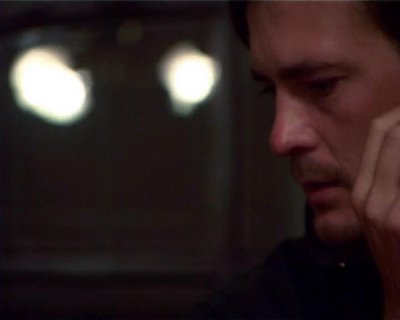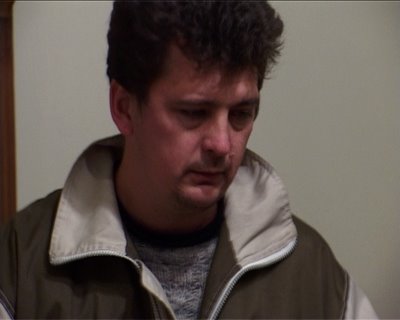Yoni Czombos was born in December 1968 and Marcel Czombos in May 1974.
They are brothers and grew up in Coronel Du Graty, a small town of around 8,000 people in southern Chaco (Argentina), 300 km away from Resistencia, the Province’s Capital.
After finishing high school, and just like so many other youngsters, they left their home town to start University courses: Yoni, Philosophy; Marcel, Social Communication.
In 1994 they make their first documentary “Nuestra identidad” (“Our identity”) where they rebuild the history of their village. With this work they win the First Prize in a competition organized by Chaco Sub Ministry of Culture, sponsored by INCAA. (National Film and Visual Arts Institute)
In 1995 for the anniversary of the first 100 years of the cinema, they release the documentary “A 100 años del nacimiento del duende” (“100 years after the birth of the goblin”) where they reflect the heyday and decline of cinema in Du Graty, their town.
Whith this work they win the “Special Mention” of the Jury awarded by the Sub Ministry of Culture and INCAA, in December 1995.
In September 1996 they get the “Second Mention” for the documentary “Chaco Aborigen” (“Aboriginal Chaco”) in Buenos Aires Second Young Art Biennial, organized by FUBA (Buenos Aires University Federation) and Buenos Aires City Government.
This documentary deals with the problematical aborigine situation.
In 1999, Marcel started studying at “Fundación Universidad del Cine” (Film University Foundation) in Buenos Aires.
That year the Czombos brothers make “Ecce Homo” a short film where for the first time they mix documentary and fiction. With “Ecce Homo” they win the “First Provincial Prize” in December 1997. During this period they take to experiencing the fusion between literature and audio-visual film, with works such as “Los Espejos” (The mirrors -1997), an experimental short film based on texts by and audio files of Jorge Luis Borges; “El Aleph” (The Aleph -1998), based on the adaptation by the same author; “Continuidad” (Continuity -1999), based on the short story “Continuidad de los parques” (Continuity of the parks) by Julio Cortazar; and the short film in 16 mm. produced by the FUC “Entre estas frías cosas” (Among these cold things - 2000), an free adaptation of Mempo Giardinelli’s short story “La máquina de dar besitos” (The machine of giving little kisses).
At the same time, and since 1996, they carry on the research and recording of the documentary “El campo de pie” (The Land Awakness) about the “Ligas agrarias” (Agrarian Leagues), a countrymen movement in North Eastern Argentina, appeared in the ‘60s and which is disintegrated by a coup d’état in 1976, considered to be the cruellest of all the dictatorships in Argentina during 20th century.
Between 1999 and 2003, Yoni worked as teacher of Ethics, Anthropology, History of Antique Philosophy and Gnoseology in different educational institutes.
At the same time Marcel worked for GP Productions in Buenos Aires, director of TV programmes such as: “El resumen de los medios” (The Media Summary); in Azul TV, “Televicio” (Televice), in Channel 9, “Asociación ilícita” (Illegal association) hosted by Adolfo Castelo, in Channel 7 and the documentaries “El Libro, una historia de la humanidad” (The Book, a Humankind History) and “Pasión”, (Pasion). He was Chief of edition of “Mariana de casa”, a daily show in Channel 13 and edited the miniseries “Lluvia negra” (Black rain) and the programmes “Medios Locos” (Crazy Media) and “Perdona Nuestros Pecados” (Forgive our sins).
Since 1995 the Czombos brothers have been registering their grandmother’s everyday life, Leontina Kuczala. She extended a familiar tradition sewing coverlets (made up of remnants of cloth from other garments) for her children, grandchildren, great grand- children, relatives and friends. “Koldra”, synthesize the quest for different elements (places, people, pictures, filming) that allow to rebuild the film maker’s identity. “Koldra” got the INCAA Special Interest in February 2005.
And currently they are writing “Chamame que se eleva” (Chamame that raises up) a documentary that uses “Coqui” Ortiz as link. He is the music designer of Se escucha? (Is it heard?). Coqui Ortiz composes, interprets and inquires into the roots of the genre he chose. The chamamé is one of the most characteristic dances and musical styles in our country, deeply enrooted in Argentine litoral.
Since 2002 they have investigated the settlements and the illegal occupation of land in Resistencia metropolitan area, in Chaco.
This originated “Se escucha? (Is it heard?) that was filmed between 2004 and 2005, and that previously, in February 2003, won the Script Contest “Crisis 2000-2002”, organized by the INCAA in order to show different aspects of the Social and Economical Crisis suffered by Argentine people due to Political Measures that ended up with former President De La Rua resignation.
They are brothers and grew up in Coronel Du Graty, a small town of around 8,000 people in southern Chaco (Argentina), 300 km away from Resistencia, the Province’s Capital.
After finishing high school, and just like so many other youngsters, they left their home town to start University courses: Yoni, Philosophy; Marcel, Social Communication.
In 1994 they make their first documentary “Nuestra identidad” (“Our identity”) where they rebuild the history of their village. With this work they win the First Prize in a competition organized by Chaco Sub Ministry of Culture, sponsored by INCAA. (National Film and Visual Arts Institute)
In 1995 for the anniversary of the first 100 years of the cinema, they release the documentary “A 100 años del nacimiento del duende” (“100 years after the birth of the goblin”) where they reflect the heyday and decline of cinema in Du Graty, their town.
Whith this work they win the “Special Mention” of the Jury awarded by the Sub Ministry of Culture and INCAA, in December 1995.
In September 1996 they get the “Second Mention” for the documentary “Chaco Aborigen” (“Aboriginal Chaco”) in Buenos Aires Second Young Art Biennial, organized by FUBA (Buenos Aires University Federation) and Buenos Aires City Government.
This documentary deals with the problematical aborigine situation.
In 1999, Marcel started studying at “Fundación Universidad del Cine” (Film University Foundation) in Buenos Aires.
That year the Czombos brothers make “Ecce Homo” a short film where for the first time they mix documentary and fiction. With “Ecce Homo” they win the “First Provincial Prize” in December 1997. During this period they take to experiencing the fusion between literature and audio-visual film, with works such as “Los Espejos” (The mirrors -1997), an experimental short film based on texts by and audio files of Jorge Luis Borges; “El Aleph” (The Aleph -1998), based on the adaptation by the same author; “Continuidad” (Continuity -1999), based on the short story “Continuidad de los parques” (Continuity of the parks) by Julio Cortazar; and the short film in 16 mm. produced by the FUC “Entre estas frías cosas” (Among these cold things - 2000), an free adaptation of Mempo Giardinelli’s short story “La máquina de dar besitos” (The machine of giving little kisses).
At the same time, and since 1996, they carry on the research and recording of the documentary “El campo de pie” (The Land Awakness) about the “Ligas agrarias” (Agrarian Leagues), a countrymen movement in North Eastern Argentina, appeared in the ‘60s and which is disintegrated by a coup d’état in 1976, considered to be the cruellest of all the dictatorships in Argentina during 20th century.
Between 1999 and 2003, Yoni worked as teacher of Ethics, Anthropology, History of Antique Philosophy and Gnoseology in different educational institutes.
At the same time Marcel worked for GP Productions in Buenos Aires, director of TV programmes such as: “El resumen de los medios” (The Media Summary); in Azul TV, “Televicio” (Televice), in Channel 9, “Asociación ilícita” (Illegal association) hosted by Adolfo Castelo, in Channel 7 and the documentaries “El Libro, una historia de la humanidad” (The Book, a Humankind History) and “Pasión”, (Pasion). He was Chief of edition of “Mariana de casa”, a daily show in Channel 13 and edited the miniseries “Lluvia negra” (Black rain) and the programmes “Medios Locos” (Crazy Media) and “Perdona Nuestros Pecados” (Forgive our sins).
Since 1995 the Czombos brothers have been registering their grandmother’s everyday life, Leontina Kuczala. She extended a familiar tradition sewing coverlets (made up of remnants of cloth from other garments) for her children, grandchildren, great grand- children, relatives and friends. “Koldra”, synthesize the quest for different elements (places, people, pictures, filming) that allow to rebuild the film maker’s identity. “Koldra” got the INCAA Special Interest in February 2005.
And currently they are writing “Chamame que se eleva” (Chamame that raises up) a documentary that uses “Coqui” Ortiz as link. He is the music designer of Se escucha? (Is it heard?). Coqui Ortiz composes, interprets and inquires into the roots of the genre he chose. The chamamé is one of the most characteristic dances and musical styles in our country, deeply enrooted in Argentine litoral.
Since 2002 they have investigated the settlements and the illegal occupation of land in Resistencia metropolitan area, in Chaco.
This originated “Se escucha? (Is it heard?) that was filmed between 2004 and 2005, and that previously, in February 2003, won the Script Contest “Crisis 2000-2002”, organized by the INCAA in order to show different aspects of the Social and Economical Crisis suffered by Argentine people due to Political Measures that ended up with former President De La Rua resignation.



No hay comentarios.:
Publicar un comentario